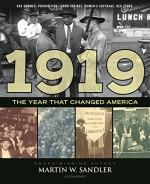|
This section contains 1,088 words (approx. 3 pages at 400 words per page) |

|
Summary
In 1919, the Eighteenth Amendment was ratified which banned the manufacture, sale, and transfer of alcohol. This period was known as Prohibition. Throughout American history, the population had steadily become more and more reliant on alcohol. The rise of saloons after the Civil War was a visible symbol of a national problem: "the abuse of alcohol, mostly by men, was wreaking havoc, particularly on families and on women" (151). Concern about alcohol abuse led to the rise of the temperance movement in the 1820s. The desire to moderate alcohol consumption eventually grew as the nation's collective drinking problem worsened, and the temperance movement evolved to advocate a total ban on alcohol. Major supporters of Prohibition include the Anti-Saloon League, preacher Billy Sunday and a woman named Carrie Nation. Nation became notorious for vandalizing saloons across the country. After her death, federal agents...
(read more from the Chapter Six: A Noble Experiment Summary)
|
This section contains 1,088 words (approx. 3 pages at 400 words per page) |

|




